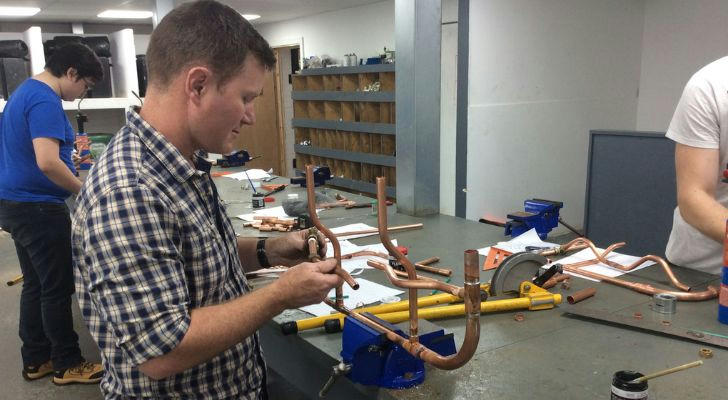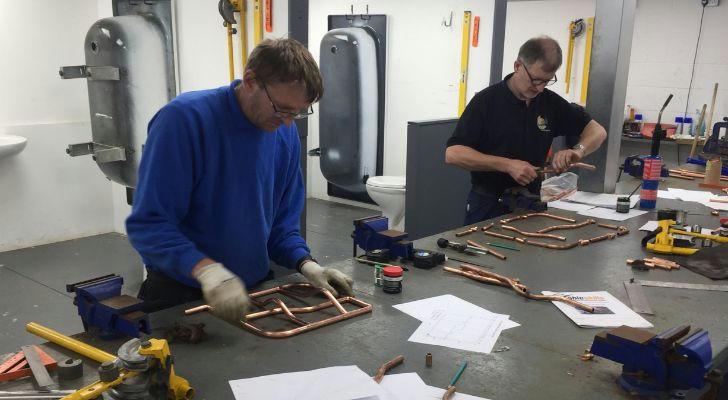Government-Supported Plumbing Technician Training: Learn While You Earn
The plumbing industry offers stable, high-paying career opportunities for skilled professionals. With government-supported training programs, aspiring plumbers can gain essential hands-on experience while earning an income, securing a well-paying job without accumulating student debt.

🚰 Why Choose a Career in Plumbing?
Government-funded training programs provide an affordable entry into the plumbing industry. These programs, often supported by trade organizations and labor departments, offer structured curriculums, paid apprenticeships, and recognized certifications.
Job Security
The demand for plumbers continues to grow. According to the U.S. Bureau of Labor Statistics (BLS), employment for plumbers, pipefitters, and steamfitters is projected to increase by 5% from 2022 to 2032, aligning with national job growth averages.
High Salaries
Plumbers can earn between $40,000 and $100,000+ annually, depending on experience and specialization. The BLS reports that the median annual wage for plumbers is around $60,000, while master plumbers and specialized professionals can earn over $90,000 per year.
Affordable Training
Unlike four-year college degrees, many plumbing apprenticeship programs cost little to nothing, and some even offer stipends to trainees. The Department of Labor estimates that plumbing apprenticeships save students up to $30,000 in tuition costs compared to traditional college programs.
Career Advancement
With the right training and certifications, plumbers can move into specialized fields such as commercial plumbing, industrial piping, or plumbing inspection. Some even start their own businesses, increasing their earning potential significantly.
Work Anywhere
Plumbing is an essential service worldwide. Whether in residential homes, commercial buildings, or large-scale industrial projects, skilled plumbers are always in demand.
🛠 Training Programs & Certifications
✅ Certified Plumbing Technician Programs
Approved courses covering plumbing fundamentals, safety, and installation techniques.
Hands-on training with experienced professionals.
Certification opens doors to both government and private sector jobs.
💼 Department of Labor Registered Apprenticeships
Classroom learning combined with on-the-job training at plumbing companies and construction firms.
Apprentices earn while they learn, reducing financial strain.
Programs typically last 4-5 years and lead directly to journeyman plumber licensing.
🏫 Community Colleges & Technical Schools
Government-funded plumbing courses available.
Partnerships with contractors and unions provide internships and networking opportunities.
Some institutions allow credit transfers for further education in mechanical engineering or construction management.
🤝 Industry Partnerships
Collaboration between government agencies and trade associations ensures affordable training and job placement.
Programs integrate new plumbing technologies, such as smart water systems and energy-efficient fixtures.
⚙️ Core Training Content
Plumbing trainees receive hands-on experience in:
Pipe Installation & Repair: Working with copper, PVC, PEX, and steel pipes.
Water & Gas Systems: Learning the safe installation of plumbing and heating systems.
Fixture Installation: Installing sinks, toilets, water heaters, and filtration systems.
Blueprint Reading & Regulations: Understanding building codes and safety standards.
Leak Detection & Prevention: Using modern diagnostic tools to detect and repair leaks efficiently.
Green Plumbing Technologies: Training in water conservation systems and solar heating solutions.

💰 Salary Expectations
Plumbing offers a clear income growth path, with salaries increasing based on experience and specialization.
| Experience Level | Monthly Salary | Annual Salary |
|---|---|---|
| Entry-Level (18-30 years old) | $3,300 - $4,500 | $40,000 - $54,000 |
| Mid-Career (30-50 years old) | $5,000 - $7,500 | $60,000 - $90,000 |
| Senior-Level (50+ years old) | $8,000 - $12,000 | $96,000 - $144,000 |
🌍 Nationwide Career Opportunities
The need for skilled plumbers extends across urban, suburban, and rural areas. Major construction projects, aging infrastructure, and new home developments all require expert plumbing professionals.
According to the American Society of Plumbing Engineers (ASPE), the increasing demand for eco-friendly and sustainable plumbing solutions is creating even more job opportunities.
🎓 How to Apply
Starting a plumbing career is simple. Follow these steps:
📝 Pay the Application Fee – Some programs require a small $50 - $100 non-refundable fee.
📄 Provide Proof of Education – Submit high school transcripts, GED, or trade school certifications.
🗣 Meet Language Requirements – Basic English proficiency is needed for technical training.
📊 Pass Entry Exams – Some programs require a written or practical test.
🔧 Complete Hands-On Training – Participate in paid apprenticeships or internship programs.
📜 Earn Certification – Obtain a state-recognized plumbing license to start working.
🌟 Success Story: Mike’s Journey into Plumbing
Mike, a 24-year-old high school graduate, wanted a stable, high-paying job without college debt. He enrolled in a state-funded plumbing apprenticeship, where he received hands-on training while earning $3,800 per month.
Within four years, Mike passed his journeyman plumber exam and secured a $7,000/month job ($84,000 annually). Now, he is training to become a master plumber, which could push his salary past $100,000 per year.
"This career gave me financial independence. I own my home, and I love working with my hands!" – Mike, Licensed Plumber
🚀 Start Your Plumbing Career Today!
Government-supported training programs provide a low-cost, high-reward pathway into the plumbing industry. Whether you're just starting out or looking for a career change, plumbing offers financial stability, job security, and room for growth.
👉 Take the first step toward a successful career—apply today!
For more information on available training programs, visit National Plumbing Training & Education.
